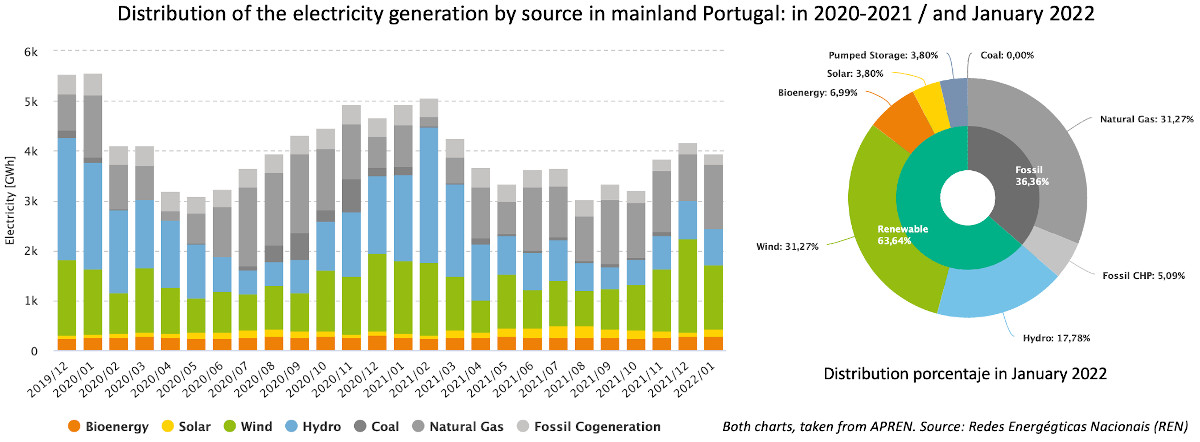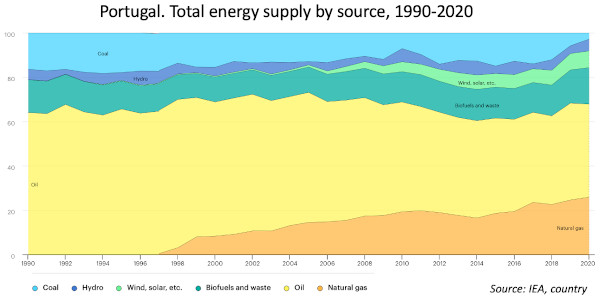In the image
National flags in a Portuguese town [Flickr/mark dyer]
Portugal seems to understand that sustainability is more than a trend, it is a vision towards the future. In the last decade, investing in this strategic development path has been seen more like a moral obligation for both entities and companies, as well as a way of achieving a positive advancement for their economy. Portugal has carried out remarkable progress in this field until becoming now a country leader in the renewable energy transition.
In 1900, more than 90% of the world’s emissions were produced in Europe and the United States, even by 1950, they accounted for more than 85% of emissions each year. Portugal entered the 20th century as a non-industrialized country due to the lack of technology and a general social backwardness in comparison to other European states. By 1910 nearly 60% of the country’s economically active population was still engaged in agriculture, 25% engaged in industry and 17% in the service sector. Portugal had few fossil fuels resources and due to the different lifestyle, their energy consumption was lower in comparison to other European countries at that time such as the UK, France or Germany, which made the carbon emissions low as well.
Portugal had a high dependency on external energy due to the shortage of fossil fuel resources and the different sector set up due to the late industrialization. Hydroelectric power did not have the capacity to meet demand needs and the increasing proportion of fossil fuels in power generation contributed to the rise in coal and especially hydrocarbon imports, making Portugal one of the European countries with the highest energy dependence, about 80% in 2010. Therefore, the country has to import all the coal used in power stations, as well as its entire oil and gas supplies, mainly from Algeria and Nigeria. Natural gas is also received in a liquid state – LNG (Liquefied Natural Gas), through tankers that dock at the Sines natural gas terminal. The gas that arrives through the Maghreb-Europe gas pipeline across the Spanish border is injected directly into the National High Pressure Natural Gas Transportation Network. Upon arrival at the Sines terminal, the LNG is transformed into its gaseous form to be introduced into this network.
Portugal’s first support scheme for renewables was established through the Decree Law 189/88 that installed an undifferentiated FiT system to all renewables, a policy mechanism designed to accelerate investment inrenewable energy technologies by offering long-term contracts to renewable energy producers. During the 1990s the European Union brought in policies to promote a common European electricity market and also to progress towards renewable energies in order to reduce environmental pollution and to break the link between economic growth and environmental degradation, so in 1995 Portugal’s electricity market converted from a vertically integrated state monopoly into a dual market structure, comprised of a Public Service System and a liberalised system. Furthermore, the Portuguese and Spanish governments made plans to integrate the two countries’ electricity market into a single Iberian Electricity Market (MIBEL) which was launched in July 2007 and the Portuguese electricity market liberalisation completed to the degree that all electricity customers were freely able to choose and change their electricity provider.
However, in the middle of this energy progress came the 2008 financial crisis and complicated the situation, as Portugal was deeply affected by it. In May 2011, due to increasingly untenable interest rates on its bonds, Portugal necessitated a bailout, in return of addressing its financial unsustainability. The entry the bailout restricted Portugal’s choice of options and made harder times for the renewable energy companies and projects, but there was no fundamental political, cultural or ideological change in regard to renewable energy. Portugal’s energy and climate policies pushed for carbon neutrality primarily through broad electrification of energy demand and a rapid expansion of renewable electricity generation, along with increased energy efficiency.
As a matter of fact, the last two months of 2019 were historical for Portugal when in November they registered a daily generation of wind power, and in December, an uninterrupted period of 100% renewable demand in mainland Portugal, lasting for 131 hours (corresponding to 5 1⁄2 days), and starting on the 18th. These achievements were a result of high hydroelectricity and wind generation, once again demonstrating the high resilience of the national power system while facing significant amounts of renewables integration in the grid.
Regarding the boosters of this process, there is a theory known as “latecomer advantage” that divides ‘pioneering’ countries from ‘follower’ ones, and claims that technological backwardness of the ‘followers’ allows them to absorb the most recent innovations developed in the latter, without having to bear the initial costs of development. In the case of Portugal, it is an intermediate economy and a typical case of “follower” of technological changes initiated in the more advanced economies and as the theory says we can see a spectacular progression towards renewable energy.
In January 2022, 4,085 GWh of electricity were generated in mainland Portugal, where 63.64% came from renewable sources being 31.27% wind, 17.78% hydro, 6.99% bioenergy, 3.80% solar and 3.80 pumping. However, Portugal still remains reliant on imported fossil fuels, as the remaining 36.36% came from fossil fuels such as gas natural, that accounted a 31.27%.



